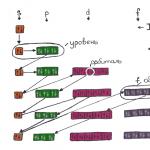1980 - graduated from the Faculty of Psychology of Yaroslavl state university and received a qualification as an educational psychologist.
1988 - defense of a candidate's dissertation in psychology.
2000 - defense of doctoral dissertation in psychology.
Topic of the candidate's dissertation
Diagnostics of mnemonic abilities of schoolchildren aged 10-12 years
Doctoral dissertation topic
Psychology of mnemonic abilities
Courses for the current academic year
Psychology of general secondary (complete) education
Psychology secondary school
Publications
More than 200 publications, including:
a) articles:
- Analysis of methods of processing material during memorization and reproduction // Career guidance for schoolchildren: Sat. scientific works – Yaroslavl: YAGPI, 1987. – P. 135 – 144.
- On the structure of operational mechanisms of mnemonic abilities // Career guidance and training: Sat. scientific works – Yaroslavl: YAGPI, 1988. – P. 42 – 55.
- Levels of development of mnemonic abilities // Abilities and activities: Sat. scientific tr. – Yaroslavl: YAGPI Publishing House, 1989. – P. 137-146.
- The problem of the structure of intelligence // Actual problems modern psychology. Volume II. – Kharkov: KhSU Publishing House, 1995. – P. 91 – 95.
- Teacher’s personality: spirituality, intellectuality, mentality // Psychology of pedagogical thinking and experiment. – M.: IPRAN, 1998. – P. 126 – 132.
- Personalization educational process: problems of methodology and practice // Psychology of pedagogical thinking: theory and practice. – M.: IPRAN, 1998. – P. 87 – 95.
- On the problem of regularity in psychology // Problems of general and organizational psychology: Collection scientific works– Yaroslavl: YarSU, 1999.
- On the problem of the ontology of abilities and giftedness // Yaroslavl Psychological Bulletin. – Yaroslavl, YarSU, 1999. – Issue. 1. – pp. 23 – 31
- Structure and types of operational mechanisms of mnemonic abilities // General and applied psychology: Reader. M. Yaroslavl, 2001. – P. 440 – 468.
- Laws and patterns in psychology // Current issues of modern psychology. Materials of the interuniversity scientific and practical conference April 12, 2001. – M. Orekhovo-Zuevo: OZPI, 2001. – P. 22 – 28
- Abilities and the problem of the structure of intelligence // Scientific notes. – M.: Publishing house MGSU, 2002. No. 4. – P. 83 – 88.
- Problems of regularity in psychology // Scientific notes. – M.: Publishing house MGSU “Soyuz”, 2002, No. 5. – P. 94 – 117.
- Objective and proper psychological patterns of mental functioning // Yaroslavl Psychological Bulletin. -Yaroslavl, YarSU, - 2002. Issue. 9. – P. 7 – 3
- Correction and development of cognitive abilities // Proceedings of the conference “Correction mental development child." MGOPI, Orekhovo-Zuevo, 2003.
- On the structure of giftedness // Gifted Child, 2003, No. 6
- Abilities - characteristics of a person as an individual, subject of activity and personality // Materials of the international conference “Psychological analysis of educational and professional activity" YAGPU im. K.D. Ushinsky, Yaroslavl, 2003. p.113-116
- ABOUT psychological assistance parents of younger children school age// Materials of the seminar on correction and personality development of children from orphanages - M. - Orekhovo-Zuevo, 2004.
- Work motivation: factors and conditions // Man and Labor, No. 8, 2004, pp. 75-80.
- Modern problems of labor motivation // Scientific notes of the RGSU, 2005, No. 2 – pp. 14-23.
- The problem of actual psychological patterns in psychological science // Scientific notes No. 3, 2005, RGSU
- Properties of the psyche and the problem of the actual psychological pattern // Materials of the IV Russian Philosophical Congress, M., 2005.
- Professional abilities of a social work specialist // Otechestvennyi zhurnal social work. 2006, No. 1. (co-authored)
- Value orientations of modern youth as the basis of social responsibility // Social politics and Sociology, 2006, No. 3, pp. 146-154.
- Neuropsychological aspects of the effectiveness of mnemonic abilities of active cyber players // Bulletin of the Russian Humanitarian Science Foundation, 2008, No. 3. –.p.176-183 (co-authored)
- The influence of Internet activities on the communicative and cognitive processes of the subject // Cognition in the structure of communication / M.: Publishing House "Institute of Psychology of the Russian Academy of Sciences", 2009. P. 331-339.
- Deprofessionalization as the basis for the crisis of responsible subjectivity and conscious subjectivity // Systemogenesis of educational and professional activities. Sat. scientific Proceedings of the IV All-Russian Scientific and Practical Conference November 24-25, 2009. Yaroslavl, Yaroslavl State Pedagogical University – p.278-279
- The effectiveness of mnemonic abilities and the reaction time of gamers // Questions of psychology. 2009. No. 5. P. 84-93, (co-authored)
- The influence of Internet activity on the subject’s mnemonic abilities // Psychology. Magazine High School Economics. 2010. T. 7. No. 3. P. 57 – 72.
- Labor resources: the problem of deprofessionalization // Personnel manager. Personnel management. 2010. No. 9.
- Abilities in the structure of intelligence // Psychology of intelligence and creativity: Traditions and innovations: Materials. conference dedicated to the memory of Ya.A. Ponomarev and V.N. Druzhinin, IP RAS, October 7-8, 2010 - M.: Publishing house "Institute of Psychology RAS", 2010.
- Quality of labor resources: a threat to national security // National security: scientific and state management content: mat. All-Russian scientific Conf., December 4, 2009, Moscow, - M.: Scientific expert. 2010.
- About the threat of the virtual world to the real one // Materials of the Futurological Congress. M.: 2010
- The third “wave” of deprofessionalization // Man and Labor 2010, No. 11.
- About labor resources and the problem of deprofessionalization // Theoretical and experimental psychology, 2010, Vol. 3, No. 1, p. 39-48.
- Mnemonic abilities of schoolchildren as a factor in successful reproduction educational material// Psychology of learning, No. 4, 2011 (co-author)
- The effect of the inability to copy previously memorized material by children with mental retardation // Pedagogical and Psychological issues in Education -2010. 2010. V -25.p.162-172, (co-author)
- About the need systematic approach to the study and management of the development of human capital // Man and Labor, 2011, No. 1, pp. 22-25.
- Mnemonic abilities junior schoolchildren with mental retardation // Questions of psychology, 2011, No. 5, pp. 34-45. (co-authored)
- Structure of mnemonic abilities of younger schoolchildren with mental retardation // Experimental psychology. 2012, No. 1, (co-author)
- Reproduction of educational material by schoolchildren with different levels of development of mnemonic abilities // electronic journal " Psychological Science and education www.psyedu.ru "-2011.No. 3. – http:// psyedu.ru/ journal/ 2011/3/2420.phtml (co-authored)
- About forgetting educational material // Experimental psychology. 2011.- No. 3.- p. 97-125. (co-author).
- INTERNET-ACTIVITY (Internet-Players') of Children Aged 10-12, 14-16, of Students Aged 18-20, and of old People Aged 25-40 // International Conference on Thinking of the Education and New Learning Technologies held in BARCELONA, 4-6 July, 2011.
- Influence of internet – activity for people’s cognitive abilities. The 2nd International Conference on Education and Educational Psychology 2011 (ICEEPSY 2011). Elsevier Procedia – Social and Behavioral Sciences, Volume 29 (2011), p. 1625 – 1634.
- The development of structure of human cognitive abilities // 15 European Conference on Developmental Psychology 23-27 August 2011 – Bergen – Norway. (co-author)
- The internet-activity as the development and formation factor of cognitive abilities// European Science and Technology: materials of the 11 international research and practice conference, May, 2012.- Wiesbaden, Germany, 2012, p.395-408.
- Cognitive style in the structure of women’s mnemonic abilities // Psychological Science and Education, No. 1, 2012, pp. 100-110. (co-author)
- The influence of computer games on the cognitive abilities. ICERI 2012 Proceedings, 5th International Conference of Education, Research and Innovations, Madrid, Spain. 19-21 November, 2012, pp.3515-3518. (co-author)
- The internet – activity as the development and formation factor of cognitive abilities. 7th Annual Education and Development Conference, March 5 – 7 2012, Bangkok, Thailand, Conference Proceedings published by Tomorrow People Organization.
- The effectiveness of mnemonic abilities in conditions of splitting the cognitive style - field dependence / field independence // Current problems of psychological knowledge 2013, No. 3, 0.8 p.p. (co-author)
- MNEMONIC ABILITIES OF INTERNET – ACTIVE ADOLESCENTS // Journal of Modern Education Review Academic Star Publishing Company, USA 2013.
- About the laws of reproduction of educational material // European Applied Sciences. #5. 2013. 151-155. (co-author)
- How to stimulate labor activity // Man and Labor, 2013, No. 10. P.71-72.
- Relevance of the problem of stimulating labor activity // Man and Labor, 2013, No. 7, pp. 66-68
- Internet activity as a factor influencing the cognitive abilities of senior schoolchildren // Bulletin of Moscow University. Series 20.Pedagogical education. 2013, No. 1, p. 94-114.
- On the structure of giftedness and patterns of its manifestation //. Teacher 21st century, No. 2, pp. 341-347.
- Splitting the cognitive style field-dependence / field-independence and speed of memorizing the nonverbal nonsense material. // Asian Journal of Humanities and Social Sciences, 8, pp. 58 – 69. http://ajhss.org/pdfs/Vol2Issue3/7.pfd (co-author)
- Preservation of educational material: factors and conditions // Psychology of Education - 2014. - No. 12. – P.16-25 in co-authors)
- The speed of memorization of non-verbal meaningless material and the cognitive style of polydependence/polyindependence // New in psychological and pedagogical research. No. 4. pp. 120-134. (co-authored)
- State ideology as a factor in the preservation and development of Russia // Bulletin of MGOGI. Series pedagogy and psychology. No. 1, 2014, pp. 100-112.
- Problems of the typology of mnemonic abilities // Bulletin of MGOGI. Series pedagogy and psychology, No. 1, 2015
- Russian character as a subject of education // Bulletin of Moscow State University. Series 20. Pedagogical education, 2015, No. 2, pp. 39-47.
- Study of the foundations of the typology of mnemonic abilities / Bulletin of the State University of Humanities and Technology, No. 4, 2016.
- Patterns of reproduction of educational text based on longitudinal research // Psychology of Education, No. 12, 2016.
- Structure and phenomenology of types of mnemonic abilities, Bulletin of the State University of Humanities and Technology, No. 1, 2017, p. 45-53.
- Views of B.M. Teplov in the light of modern research on the psychology of abilities // Materials of the international conference dedicated to the 120th anniversary of the birth of B.M. Teplova, M.; PIRAO, 2017, p. 167-173
- ABILITIES AS TOOLS – BASED COGNITIVE MANIFESTATIONS // The scientific method, 2017.№6, pp.86-91.
- Relationship between General and Special Abilities on the Example of Linguistic Abilities//Asian Journal of Humanities and Social Studies (issn:2321-2799), Vol.5, No.5, 2017.
- Working Memory Span Research for Geometric Material Processing// Asian Journal of Humanities and Social Studies (issn:2321-2799), Vol.5, No.6, 2017 (co-author). 2018
- Patterns of updating knowledge based on longitudinal research materials // Izvestia Russian Academy education. 2018. No. 2. pp. 79-92. VAK (co-author).
b) monographs, teaching aids and textbooks:
- Mnemonic abilities: diagnosis and development. M.: Pedagogika, 1990 (co-author);
- Development of children's memory. Tutorial. Yaroslavl: Academy of Development, 1995, 1996.
- Development of children's attention. Tutorial. Yaroslavl: Academy of Development, 1996, 1997.
- How best to remember what you have learned (chapter) // Encyclopedia of education and development of preschoolers. – Yaroslavl: Academy of Development, Academy Holding, 2001. – P. 140 – 167.
- 100 games for memory development. M.: Logos, 2001.
- Memory. // General psychology. Textbook. – M.: Gardariki, 2002, 2005 – P. 65 -77.
- Memory. Children 7-10 years old. Yaroslavl, Development Academy: Academy Holding, 2002, 2007
- Psychology of memory. Tutorial. M.: Publishing center "Academy", 2002.
- Professional abilities. Memory and representation // chapters in the textbook “Work Psychology”. M.: 2002, 2003, 2014, 2016
- Development of memory in children. Tutorial. M.: Publishing center "Academy", 2005.
- Psychology of memory. Tutorial. M.: Aspect Press, 2009.
- Memory: patterns of reproduction of educational material. M.: Prometheus, 2012, (co-author)
- The influence of Internet activity on the cognitive abilities of schoolchildren // Modern Russian pedagogy. Agricultural Publishing House of China, 2015, pp. 105-115 (monograph in Chinese).
Training
1991 - training courses for trainers and consultants, Leningrad State University.
2002 - short-term training at the State Coordination Center information technologies Ministry of Education of Russia under the program "Modern requirements for the organization of educational and educational process at the university", 72 hours.
2003 - “Management and administration in the education system”, RGSU, 72 hours.
2009 - "Strengthening potential liberal arts universities SCO: development and implementation of joint innovative ICT infrastructure, taking advantage of strategic international cooperation", MSLU.
State and departmental awards
Government Certificates Yaroslavl region and the Moscow Government for training highly qualified specialists.
Achievements and awards
2011 - article Cheremoshkina L. V. Influence of internet – activity for people’s cognitive abilities. (The 2nd International Conference on Education and Educational Psychology 2011 (ICEEPSY 2011). Elsevier Procedia - Social and Behavioral Sciences, Volume 29 (2011), p. 1625 – 1634) was selected for the US Library of Congress.
2014 - biography published in the encyclopedia Who's Who in the World(Volume 32).
2014 - guest editor of a series of articles in The Open Social Science Journal.
Diplomas at the university level for victories in scientific and methodological work competitions.
Archive of training courses
Psychology
Methodology of psychology
Age-related psychology
Pedagogical psychology
Memory development
Active parenting methods
Psychodiagnostics
Psychological testing
Psychological foundations of professional communication
Psychological foundations of professional personality development
Development of psychological and pedagogical competence
Professional activity
1998 – 1999 – member of the expert council of the Ministry of Education of the Russian Federation for the “Gifted Children” program.
2001 – 2002 – Member of the Scientific and Methodological Council of the Russian Ministry of Defense for Differential Psychology.
2001 – 2005 – founder and head of the Department of Occupational Psychology at RGSU.
2002 – 2005 – founder and head of the laboratory of psychology of professional activity at the Department of Labor Psychology of the Russian State University of Social Sciences
2002 – 2005 – participated in the preparation and opening of a master’s program in labor psychology and organizational psychology at the Russian State University of Social Sciences.
2001 – 2006 – Member of dissertation councils at RGSU and YarSU.
2010 -2011 – head and psychologist-consultant of the psychological service of the Faculty of IT, Moscow State University of Psychology and Education.
Research projects and grants
2005 - University grants: “Diagnostics of professional abilities”, “Structure of professionally important qualities and abilities of a social worker”, “Psychological analysis of pedagogical activity”, “Competence-based approach to modern training psychologists", "Employment of persons with disabilities" (project manager).
2004 - 2006 - Grant from the Russian Humanitarian Foundation “Features of the worldview and cognitive sphere of the Internet “resident”” (project director).
2008 - 2010 - Grant of the Russian Humanitarian Foundation "The influence of Internet activities on the cognitive abilities of the subject" (project manager).
Additional Information
Head of the scientific school “Psychology of memory and mnemonic abilities”. Within the framework of this direction, under the leadership of L.V. Cheremoshkina completed 8 candidate dissertations, about 160 theses, 5 master's theses.
Currently, research is being conducted in the following areas:
- Psychology of reproduction.
- The nature of cognitive activity in the process of memorization and reproduction.
- Genesis of mnemonic abilities.
- Mnemonic abilities as a substructure of intelligence.
- The structure of mnemonic abilities.
- Mnemonic abilities of children with developmental problems.
- Mnemonic abilities in the structure of musical and psychomotor abilities.
Member of dissertation councils at Moscow State Pedagogical University and the Higher School of Economics Research Institute.
Automatic systems of games, tasks and exercises for the development of memory in preschoolers, primary schoolchildren and teenagers.
Over the past 25 years, he has been consulting psychologists, teachers, and parents on the psychology of the cognitive sphere of the individual (learning retardation, mental retardation, the influence of somatic processes on cognitive abilities and etc.)
The manual describes for the first time the actual psychological ones: patterns of memory functioning and mnemonic abilities. The presented material will allow the reader to understand how and why information is remembered, forgotten or recalled.
The origin and structure of mnemonic abilities are presented using extensive experimental material.
For students of psychology departments, practicing psychologists, and anyone interested in memory problems.
Textbook for higher education students educational institutions. Recommended by the Council on Psychology of the Educational and Methodological Association for Classical University Education as teaching aid for students of higher educational institutions studying in the direction and specialties of psychology.
Series: “Higher Education”.
M.: Publishing center "Academy", 2002.
ISBN 5-7695-0924-4
Number of pages: 368.
- 3 Introduction
- 8
Chapter 1. Short story experimental study of memory
- 8 1.1. The concept of "memory"
- 20 1.2. Origin of memory
- 27 1.3. Study psychological mechanisms memory
- 39 1.4. The problem of memory structure
- 48
Chapter 2. Memory and mnemonic abilities
- 48 2.1. The problem of the concept of “ability” in psychology
- 62 2.2. The relationship between the concepts of “memory” and “mnemonic abilities”
- 72 2.3. The problem of regularity in psychology
- 84 2.4. The actual psychological patterns of the functioning of memory and mnemonic abilities
- 99
2.5. The problem of method in the psychology of mnemonic abilities
- 99 2.5.1. Basic requirements for methods of studying mnemonic abilities
- 103 2.5.2. Method of deploying mnemonic activity
- 116
Chapter 3. Functional mechanisms of mnemonic abilities
- 116 3.1. The concept of functional mechanisms of mnemonic abilities
- 121 3.2. Psychophysiological studies of functional mechanisms of mnemonic abilities
- 130 3.3. Study of the functional mechanisms of mnemonic abilities using the method of deploying mnemonic activity
- 147 3.4. Functional mechanisms of mnemonic abilities based on the results psychological research
- 157 3.5. Information principle of brain functioning and functional mechanisms of mnemonic abilities
- 165
Chapter 4. Operating mechanisms of mnemonic abilities
- 165 4.1. The concept of operating mechanisms of mnemonic abilities
- 176 4.2. Types of operating mechanisms of mnemonic abilities
- 188 4.3. Study of the operational mechanisms of mnemonic abilities using the method of deploying mnemonic activity
- 207 4.4. The problem of the origin of operational mechanisms of mnemonic abilities
- 242
4.5. Operational mechanisms and the problem of the typical in mnemonic abilities
- 246 4.3.1. Study of the foundations of the typology of mnemonic abilities
- 250 4.5.2. Dependence of the level of functioning of operational mechanisms of mnemonic abilities on the effectiveness of functional and operational mechanisms
- 251 4.5.3. Relationships between levels of cognitive activity of mnemonic abilities and intelligence indicators according to D. Wechsler’s method
- 254 4.5.4. Study of the relationship between the levels of functioning of the operating mechanisms of mnemonic abilities and cognitive styles
- 259 4.6. Structure and phenomenology of the type of mnemonic abilities
- 271
Chapter 5. Psychology of regulatory mechanisms of mnemonic abilities
- 271 5.1. The concept of regulatory mechanisms of mnemonic abilities
- 286 5.2. The structure of regulatory mechanisms of mnemonic abilities
- 296 5.3. Study of the regulatory mechanisms of mnemonic abilities using the method of deploying mnemonic activity
- 313 5.4. Regulatory mechanisms as the basis of subjective-personal patterns of functioning of mnemonic abilities
- 338 5.5. Development of mnemonic abilities
- 351 Bibliography
- 367 Table of contents
Download:
L. V. Cheremoshkina
MEMORY DEVELOPMENT
.. %».
CHILDREN
A popular guide for parents and teachers
YAROSLAVL "ACADEMY OF DEVELOPMENT* 1996
L. V. Cheremoshkina
Development of children's memory. A popular guide for parents and teachers. - Yaroslavl: “Academy of Development”, 1996. - 240 p., ill.
This book is aimed at developing the memory of children of different ages, from preschoolers to teenagers. The book contains games, "tasks and exercises, the use of which does not require additional training and special education. The book can be recommended to parents, teachers, and educators.
ISBN 5-7707-0007-9 © * Development Academy", 1996
© Cheremoshkina JI. V., 1996 © Artists Dushin M., Kurov V., 1996
TABLE OF CONTENTS
What is memory?........................5
I. Preschool children® ...................................17
§ 1. Features of the development of children's memory
from 3 to 7 years............... ...............19
§ 2. Games, tasks and exercises for
memory development of children from 3 to 7 years old 22 § 3. Diagnosis of the level of memory development
preschoolers........................45
Diagnosis of natural memory. ... 45 Diagnosis of cultural memory.... 47
II. Children of primary school age (7-10
years).........................................49
§ 1. Peculiarities of memory of children 7-10 years old. 51 § 2. Games, tasks and exercises for
memory development of children 7-10 years old. . . 54 § 3. Diagnosis of the level of memory development
junior schoolchild...................83
Diagnosis of natural memory. ... 83 Diagnosis of cultural memory. ...85
III. Teenagers (11-15 years old) ............................87
§ 1. Peculiarities of memory of adolescents. ... 89
§ 2. Games, tasks and exercises that develop the memory of adolescents..................................... 92
§ 3. Diagnosis of the level of memory development
teenagers........................146
Diagnosis of natural memory. . . 146
Diagnosis of cultural memory. . . 150
How to Help Children Learn Lessons (Instead of Imprisonment) ....................................154
Appendix...................................161
Literature........................................237
WHAT IS MEMORY?
Memory is the basis of mental life, the basis of our consciousness. This is a magic box that preserves our past for our future. A person without memory would not be a person. Any simple or complex activity (reading, writing, or reflecting on one’s own behavior) is based on the fact that the image of what is perceived is retained in memory for at least a few seconds. If there were no memory, we would not be able to understand a single sentence, since, before we had time to read to the end, we would have forgotten its beginning. Information from our senses would be useless if memory did not retain connections between individual facts and events.
Memory has many faces. There is a certain stock of words, information, concepts, images that are stored in memory, as in an arsenal, all life; This given name, images of dad and mom, native language, features and characteristics of the place where a person was born, etc. All this is long-term memory. But short-term memory also exists. For example, you need to remember to tell your son to put on a clean shirt, don’t forget to buy a newspaper, etc. But then the day has passed, and many of the details associated with it fade into the background. In this case, the information was not stored for long: seconds or minutes. This kind of memory is called short-term memory.
s
MEMORY DEVELOPMENT
But short-term memory can turn into long-term memory. There are situations when, barely looking at a random passerby, we can unmistakably recognize a face that was shown to us in a photograph a long time ago.
We receive information through different senses: vision, hearing, smell, touch and taste. Accordingly, they distinguish: visual, auditory, olfactory, tactile and taste memory. In addition, depending on what information a person remembers, we can distinguish: memory for words (verbal
or verbal memory), memory for images (figurative), memory for NK movements (motor), memory for emotions, feelings, experiences (emotional), memory for the location of objects in space, for time periods, for numbers, surnames, faces, etc. However, the endless division of memory into types can become confusing and boring. The purpose of the proposed book is different: to help you understand the nuances and features of remembering and forgetting, to learn to develop your memory and the memory of your children.
To do this, at least, it is necessary to understand the structure of memory, its structure. The basis of memory is the genetically determined ability to imprint information, in other words, the natural plasticity of the nerve-brain tissue (“mneme”). In what follows, we will call the basis of memory natural memory. To the greatest extent, the capabilities of natural memory are manifested in preschool age. Most likely, natural memory matures precisely during this period (up to 7 years), and may not develop in the future. (In some cases, in the presence of nervous diseases, when the child is overtired, etc., this ability weakens.)
1 >




